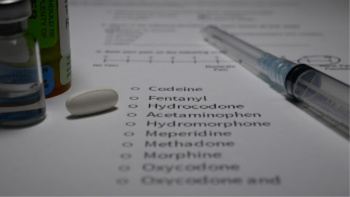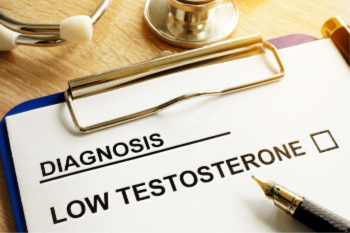
Opioids are drugs derived from the opium poppy plant. The group includes prescription painkillers like fentanyl, hydrocodone, oxycodone, morphine, and codeine. While not used as a medicine, heroin is another type of opioid.
Opioids are effective for pain, but they are also highly addictive.
Opioids can also have sexual side effects. The following slides discuss some of the recent research.

Men who use opioids could be at higher risk for erectile dysfunction (ED).
In 2017, the Journal of Sexual Medicine published a review of 10 studies on opioids and ED. The authors determined that ED risk for men who used opioids went up 96%. They also found that men under age 50 were especially vulnerable, as substance abuse appeared to be more likely in this age group.
The scientists were not sure exactly what caused the link between opioids and ED but thought it might stem from physiological or psychological factors. More research was recommended.

Men who take opioids could also see their testosterone levels drop, a situation marked by low sexual interest, difficulty with erections, fatigue, and moodiness. Unfortunately, it is difficult to calculate exactly how many men taking opioids develop low testosterone, as some men don’t have symptoms at all.
Researchers have investigated whether long-acting (taken every 8 to 12 hours) or short acting (taken every 4 to 6 hours) opioids are associated with different degrees of testosterone decline. In 2013, a study in the Clinical Journal of Pain found that men who took long-acting opioids were almost 5 times more likely to have low testosterone compared to men who took the short-term variety.
More recent research has examined the link between opioid abuse and androgen (male sex hormone) deficiency. In 2018, a paper in Sexual Medicine Reviews reported that between 50% and 90% of men who chronically abuse opioids have low testosterone.

Sexual Desire and Satisfaction
Opioid use might lead to low sexual desire and sexual dissatisfaction. In 2018 Pain Medicine reported on a study of over 11,500 men and women. About half of the group had chronic pain that was not related to cancer. Opioid users were more likely to feel less sexual interest and satisfaction, especially if they had been taking the drugs for the long-term.

Sometimes, sexual side effects of opioids can be managed by lowering the dose or changing the type of pain medication altogether. Patients might also consider other pain management strategies like physical therapy.
People who feel that their opioid use is beyond their control are encouraged to talk to their doctor or a drug addiction treatment program.
Resources
- International Society for Sexual Medicine - “Review Considers Link Between Opioid Use and ED Risk”
(November 6, 2017)
https://www.issm.info/news/sex-health-headlines/review-considers-link-between-opioid-use-and-ed-risk/ - National Institute on Drug Abuse - “What are prescription opioids?”
(Revised June 2018)
https://www.drugabuse.gov/publications/drugfacts/prescription-opioids - Pain Medicine - “Chronic Pain, Opioid Therapy, Sexual Desire, and Satisfaction in Sexual Life: A Population-Based Survey”
Birke, Hanne, MPH, et al.
(Abstract. July 2, 2018)
https://academic.oup.com/painmedicine/advance-article-abstract/doi/10.1093/pm/pny122/5047910 - Reuters - “Opioids tied to bad sex life and lack of desire”
Rapaport, Lisa
(July 25, 2018)
https://www.reuters.com/article/us-health-sexuality-opioid-therapy/opioids-tied-to-bad-sex-life-and-lack-of-desire-idUSKBN1KF2S6 - SexHealthMatters.org - “Opioids and Low Testosterone”
http://www.sexhealthmatters.org/did-you-know/opioids-and-low-testosterone - Sexual Medicine Reviews - Androgen Deficiency”
Hsieh, Alan BA, et al.
“Management Strategies in Opioid Abuse and Sexual Dysfunction: A Review of Opioid-Induced
(Full-text article in press. Published online: July 26, 2018)
https://www.smr.jsexmed.org/article/S2050-0521(18)30056-8/fulltext


